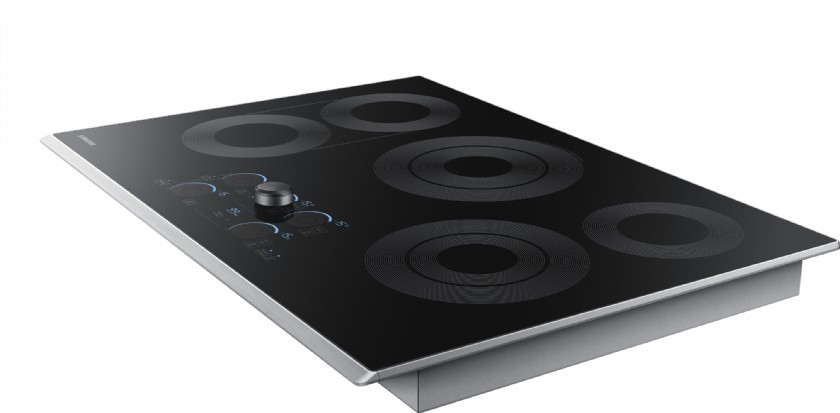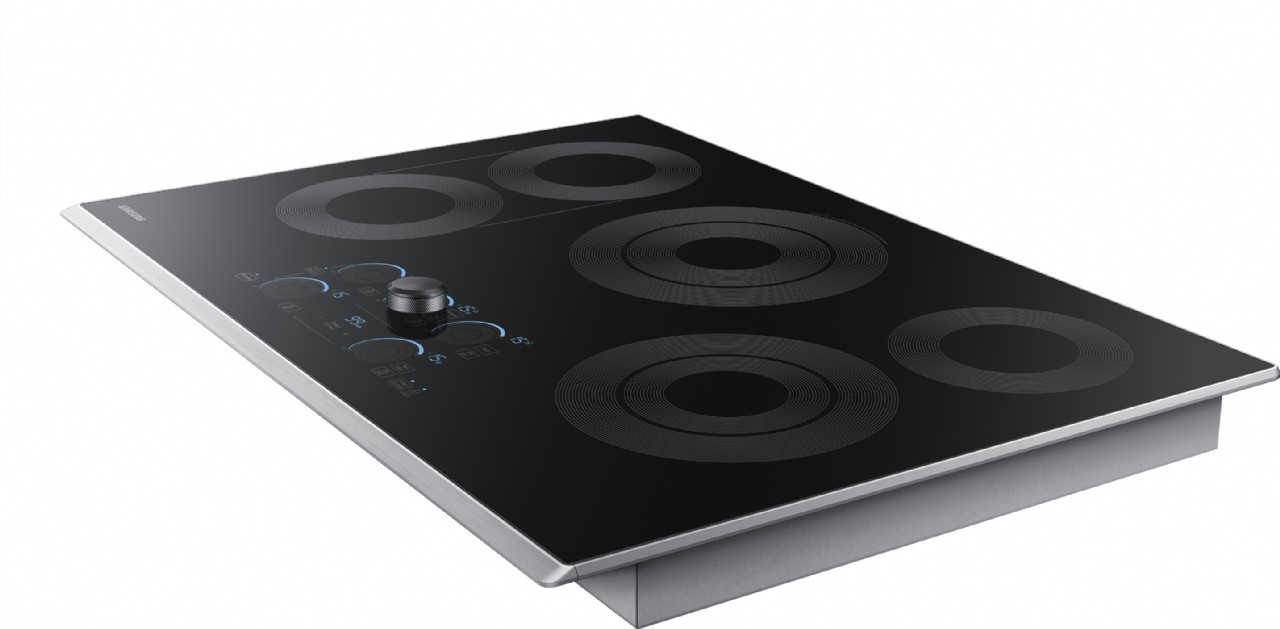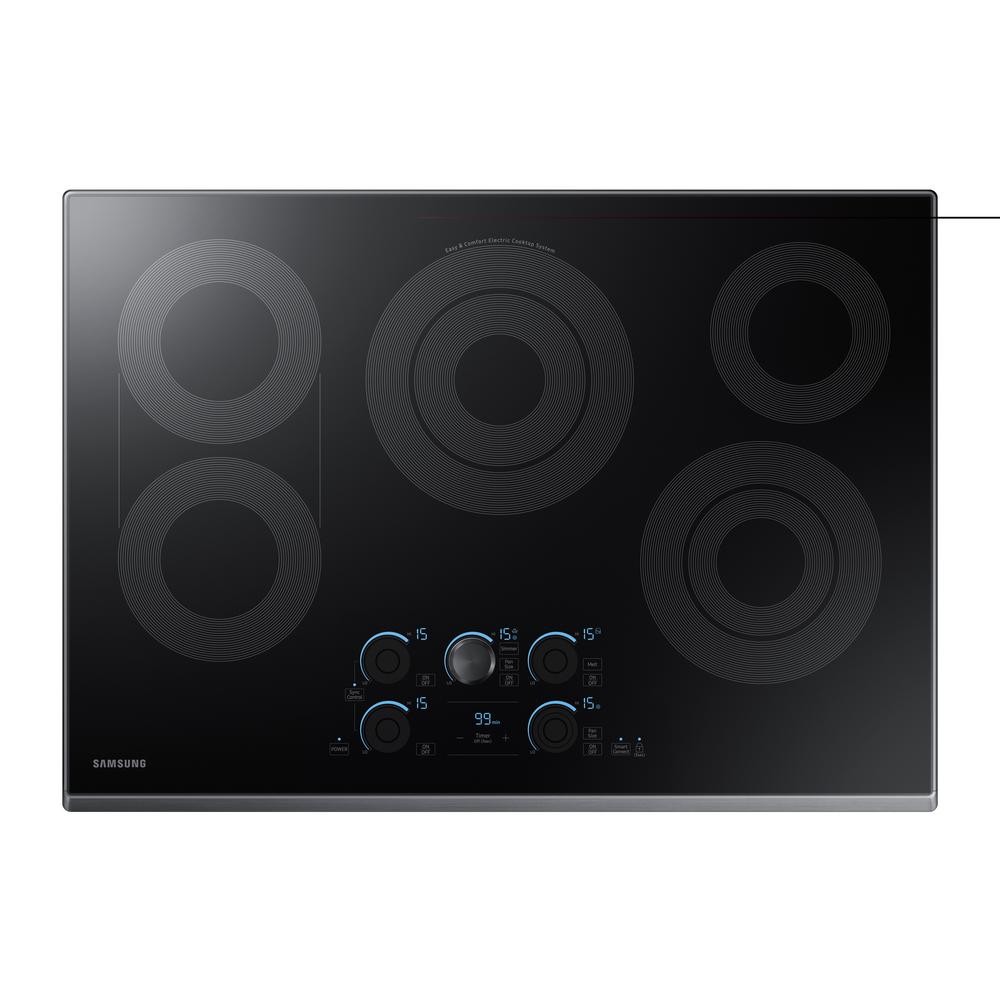
A cooktop, also known as hob, is a device commonly used for cookery which is commonly found in kitchens, for applying heat to the base of pans or pots.
Cooktops are often found integrated with an oven, or may be standalone devices.
Cooktops are commonly powered by gas or electricity and sometimes oil or other fuels are used.

• The surface elements may be hot even when off and burns can occur. Do not touch the surface elements until they have cooled down sufficiently.
• At high or medium-high settings, never leave food unattended. Boilovers cause smoking and greasy spillovers may catch on fire.
• Be sure you turn the control knob to OFF when you finish cooking.
Recommended settings
The power levels in the table below are guidelines. The power settings required for various cooking methods depend on a number of variables, including the quality of the cookware being used and the type and amount of food being cooked.
Using the right cookware can prevent many problems, such as uneven cooking or extended cooking times. Using the proper pots and pans will reduce cooking times and cook food more evenly.
What your cookware is made of determines how evenly and quickly heat is transferred from the surface element to the pan bottom.
• ALUMINUM - Excellent heat conductor. Some types of food will cause the aluminum to darken. (Anodized aluminum cookware resists staining & pitting.). If aluminum pans are slid across the ceramic cooktop, they may leave metal marks that resemble scratches. Remove these marks as soon as the cooktop cools down.
• COPPER - Excellent heat conductor but discolors easily. May leave metal marks on ceramic glass (To remove, see above.)
• STAINLESS STEEL - Slow heat conductor with uneven cooking results. Is durable, easy to clean, and resists staining.
• CAST IRON - A poor conductor; retains heat very well. Cooks evenly once cooking temperature is reached. Not recommended for use on ceramic cooktops.
• ENAMELWARE - Heating characteristics will vary depending on the base material. Porcelain enamel coating must be smooth to avoid scratching ceramic cooktops.
• GLASS - Slow heat conductor. Not recommended for ceramic cooktop surfaces because it may scratch the surface.
Cleaning
• Clean the cooktop before using it for the first time.
• Clean your cooktop daily or after each use. This will keep your cooktop looking good and can prevent damage.
• If a spillover occurs while you are cooking, immediately clean the spill from the cooking area while it is hot to prevent a tough cleaning chore later. Using extreme care, wipe the spill with a clean, dry towel.
• Do not allow spills to remain on the cooking area or the cooktop trim for a long period of time.
• Do not use abrasive cleansing powders or scouring pads which will scratch the cooktop.
• Do not use chlorine bleach, ammonia, or other cleansers not specifically recommended for use on a glass-ceramic surface.
Preventing marks and scratches
• Do not use glass cookware. It may scratch the cooktop.
• Do not place a trivet or wok ring between the cooktop and the pan. These items can mark or scratch the cooktop.
• Make sure the cooktop and the pan bottom are clean.
• Do not slide metal pans across the cooktop.
Preventing stains
• Do not use a soiled dish cloth or sponge to clean the cooktop surface. A film will remain, which may cause stains on the cooking surface after the area is heated.
• Continuously cooking on a soiled surface can result in a permanent stain.
Preventing other damage
• Do not allow plastic, sugar, or foods with high sugar content to melt onto the hot cooktop. Should this happen, clean immediately.
• Do not let a pan boil dry as this will damage the cooktop and the pan.
• Do not use the cooktop as a work surface or cutting board.
• Do not cook food directly on the cooktop. Always use the proper cookware.
Normal daily use cleaning
Use only a ceramic cooktop cleaner. Other creams may not be as effective.
By following these steps, you can maintain and protect the surface of your glass cooktop.
1. Before using the cooktop for the first time, clean it with a ceramic cooktop cleaner.
• This helps protect the top and makes cleanup easier.
• Daily use of a ceramic cooktop cleaner will help keep the cooktop looking new.
2. Shake the cleaning cream well. Apply a few drops of cleaner directly to the cooktop.
3. Use a paper towel or a cleaning pad for ceramic cooktops to clean the entire cooktop surface.
4. Use a dry cloth or paper towel to remove all cleaning residue. No need to rinse.

Removing burned-on residue
1. Allow the cooktop to cool.
2. Spread a few drops of ceramic cooktop cleaner on the entire burned residue area.
3. Using a cleaning pad for ceramic cooktops, rub the residue area, applying pressure as needed.
4. If any residue remains, repeat the steps listed above as needed.
5. For additional protection, after all residue has been removed, polish the entire surface by applying ceramic cooktop cleaner with a paper towel.
1. Allow the cooktop to cool.
2. Use a single-edge razor-blade scraper at approximately a 45° angle against the glass surface and scrape the soil. It will be necessary to apply pressure to remove the residue.
3. After scraping with the razor scraper, spread a few drops of ceramic cooktop cleaner on the entire burned residue area. Use a cleaning pad to remove any remaining residue. (Do not scrape the seal around the edges of the cooktop.)
4. For additional protection, after all residue has been removed, polish the entire surface by applying ceramic cooktop cleaner with a paper towel.
1. Be careful not to slide pots and pans across your cooktop. It will leave marks on the cooktop surface. You can remove these marks by applying ceramic cooktop cleaner with a cleaning pad for ceramic cooktops.
2. If pots with a thin overlay of aluminum or copper are allowed to boil dry, the overlay may leave black discoloration on the cooktop. You should remove this discoloration immediately or it may become permanent.
To clean the seal around the edges of the glass, lay a wet cloth on it for a few minutes, then wipe clean with a nonabrasive cleaner.
• Sugary spillovers (such as jellies, fudge, candy, syrups) or melted plastics can cause pitting of the surface of your cooktop. This is not covered under the warranty. You should clean the spill while it is still hot. Take special care when removing hot substances. Refer to the section below.
• When using a scraper, be sure it is new and the razor blade is still sharp. Do not use a dull or nicked blade.
1. Turn off all surface units. Remove hot pans.
2. Wearing an oven mitt, use a single-edge razor-blade scraper to move the spill to a cool area of the cooktop. Remove the spill with paper towels.
3. Any remaining spillover should be left until the surface of the cooktop has cooled.
4. Don’t use the surface units again until all of the residue has been completely removed.
Samsung works hard to ensure that you don’t have problems with your new cooktop. If you run into unexpected trouble, look first for a solution in the tables below.
- You may be using inappropriate cookware.
Use pans which are flat and match the diameter of the surface unit selected.
- In some areas, the power (voltage) may be low.
Cover the pan with a lid until the desired heat is obtained.

- A fuse in your home may be blown or a circuit breaker may have tripped.
Replace the fuse or reset the circuit breaker.
- The cooktop controls are set improperly.
Check if the correct control is set for the surface unit you are using.
- Food spillover was not cleaned.
Refer to the section on the care and cleaning of the glass cooktop
- The surface is hot and the model features a light-colored cooktop.
This is normal. The surface may appear discolored when it is hot. This is temporary and will disappear as the glass cools.
- The element will cycle on and off to maintain the power setting.
This is normal operation, and not a system failure. Cycling at the high power setting is normal and can occur if the cookware is too small for the cooktop element or if the cookware bottom is not flat. Use the cooktop as usual.
This is normal. The unit is still on and hot.
- The cooktop is being cleaned improperly.
Scratches are not removable. Tiny scratches will become less visible in time as a result of cleaning. Use ceramic glass top cleaning cream. Do not use chemical or corrosive agents. These agents may damage the surface of the product.
- Cookware with rough bottoms was used on the cooktop or there were coarse particles (eg. salt or sand) present between the cookware and the surface of the cooktop.
Cookware has been slid across the cooktop surface.
To avoid scratches, follow the recommended cleaning procedures. Make sure cookware bottoms are clean before use, and use cookware with smooth bottoms.
- Boilovers have been cooked onto the surface.
Wait until the surface cools down. Then, use a single-edge razor-blade scraper at approximately a 45° angle against the glass surface to remove the soil.
- Mineral deposits from water and food have been left on the surface of the cooktop.
Remove using a ceramicglass cooktop cleaning cream.
Use cookware with clean, dry bottoms. Clean the cooktop with a ceramic cleaning agent regularly every week.
- This is the sound of the metal heating and cooling during cooking.
This is normal operation and not a system failure. Use the cooktop as usual.
 103 times.
103 times.
Ask me about:

Askme / 5/6/2020 8:05:18 PM (Original: 1280X629 px)

Askme / 5/6/2020 8:05:45 PM (Original: 1000X1000 px)

Askme / 5/6/2020 8:06:18 PM (Original: 1280X720 px)
Learn how to reset your top load Samsung washer to troubleshoot error codes and cycle problems. Follow these steps to solve issues and get your washer back up and running smoothly.
/ Top load Samsung washer reset Answers: 1 1376
1376
Keep your refrigerator running efficiently and lasting longer with these easy maintenance tips. Regular cleaning, temperature checks, and condenser coil care are key.
/ Refrigerator maintenance tips Answers: 0 833
833
Learn how to reset your Whirlpool washer by following the troubleshooting steps outlined in the user manual to fix common issues quickly and easily.
/ Whirlpool washer user manual reset instructions Answers: 0 498
498
Learn how to locate and troubleshoot the thermal fuse in your GE dishwasher for potential heating issues with our step-by-step guide.
/ Finding thermal fuse in GE dishwasher Answers: 0 295
295
Discover the recommended steps for resetting the defrost timer on a refrigeration unit to maximize performance and efficiency. Keep your unit working smoothly!
/ Defrost timer reset procedure Answers: 0 391
391
Discover how refrigerators use a timer control system to regulate the defrost cycle, preventing ice buildup and ensuring efficient cooling for optimal performance.
/ Timer control for refrigerator defrost Answers: 0 312
312
Troubleshoot and fix the H2O error code on your GE dishwasher with our helpful tips to ensure it runs smoothly again. Follow our step-by-step guide now!
/ Repairing H2O error code on GE dishwasher Answers: 0 347
347
Troubleshoot and fix the H2O error code on your GE dishwasher with our helpful tips to ensure it runs smoothly again. Follow our step-by-step guide now!
/ Repairing H2O error code on GE dishwasher Answers: 0 426
426
Learn how to safely bypass the thermal fuse on your GE dishwasher to troubleshoot electrical issues without causing any damage or risk of injury.
/ GE dishwasher thermal fuse bypass Answers: 0 487
487
Learn how to reset your Samsung washing machine to fix operational problems and restore it to its original factory settings easily.
/ Resetting Samsung washing machine Answers: 0 312
312
Discover the most common error codes on Asko washing machines and learn how to resolve them with our troubleshooting guide. Keep your appliance running smoothly!
/ Asko washing machine problem codes Answers: 0 170
170
Learn how to prevent Dyson vacuum battery overcharging and extend its lifespan with simple tips and tricks. Keep your vacuum running efficiently for longer!
/ Dyson battery overcharging Answers: 0 155
155
Learn how to reset the settings on your Frigidaire dishwasher to troubleshoot common issues and get it working properly again.
/ Resetting Frigidaire dishwasher settings Answers: 0 163
163
Learn how to locate and test the thermal fuse in a GE dishwasher for continuity. Find out where it's located and how to ensure it's functioning properly.
/ Finding thermal fuse in GE dishwasher Answers: 0 160
160
Discover the recommended charging guidelines for Dyson vacuums to maximize performance and battery lifespan. Follow these tips for peak cleaning efficiency.
/ Dyson vacuum charging guidelines Answers: 0 156
156
tepte.com: Your Questions and Answers Resource with a Wealth of General Knowledge
Are you seeking a one-stop destination for comprehensive knowledge and answers to your burning questions? Look no further than tepte.com! Our platform is your go-to source for a wide range of information, all conveniently presented in an easily accessible question and answer format.
At tepte.com, we pride ourselves on being your reliable knowledge hub. Whether you're curious about technology, science, history, or any other subject under the sun, our extensive General Knowledge (GK) knowledge base has you covered. We've made it our mission to provide you with in-depth insights and facts on an array of topics. Read more